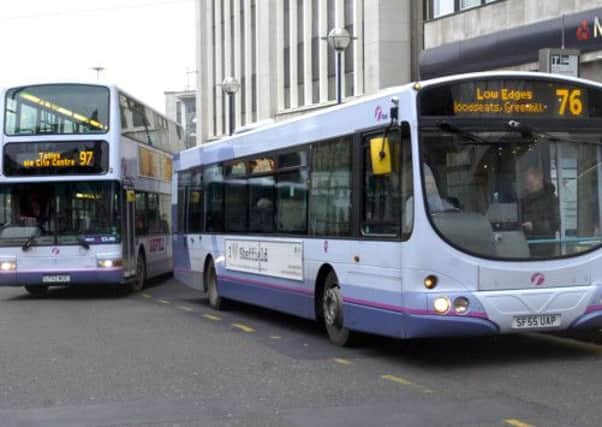Forget HS2 to get Britain moving – it’s better to go by bus


When it comes to identifying the key to Britain’s future prosperity, experts are divided.
For some it all hinges on HS2, the high speed train which would eventually link London and the North. For others it’s all about attracting lucrative investment from big name foreign companies. Amid all the debate, not many have suggested the humble bus as the driver of economic growth.
Advertisement
Hide AdAdvertisement
Hide AdHowever, according to a research carried out by Leeds University on behalf of Greener Journeys, the number 62 might be more important than many previously thought.
The report, Bus 2020: A Manifesto for the next Parliament, says buses could not only cut youth unemployment but in so doing deliver a £1.4bn boost to the UK economy. According to the figures, almost a quarter of unemployed young people say they have missed out on job opportunities because there is no bus to take them to work and elsewhere they say the network is grinding to a halt.
While most recognise the environmental benefits of public transport, weary commuters are unwilling to add an extra couple of hours onto their day simply to travel by bus through increasingly congested city centres.
Greener Journeys, however, thinks it may have come up with a solution to the problem.
Advertisement
Hide AdAdvertisement
Hide AdIts three-point manifesto calls on the next government to introduce a subsidised travel scheme, which would offer 50 per cent discounts to apprentices, which it reckons would cost in the region of £28m.
They also want employees to be able to buy season tickets for bus travel before income tax and national insurance are deducted from their salary. Its introduction would also not be cheap – around £48m. Finally, the organisation wants a further £77m set aside for the creation of bus lanes and other measures to reduce rush hour gridlock.
In total, Greener Journeys’ manifesto tots up to around £150m, but it insists the money would be paid for nine times over through the resulting economic benefits, with a further £110m boost in extra jobs.
“Everyone is talking about how the economy is beginning to grow again, but some young people are being left behind and the debate should be about more than GDP figures,” says Claire Haigh, chief executive of Greener Journeys.
Advertisement
Hide AdAdvertisement
Hide Ad“We need to give our young people the best chance to get a job and gain valuable experience and qualifications that will ensure they can play a productive part in our economy, both now and in the future. To do that, they need be able to use affordable public transport. More than half of all students over the age of 16 are frequent bus users. Many people on low incomes rely on buses and on top of that they are a cost effective way to reduce congestion and cut carbon emissions.
“Buses must be part of the solution. They are the backbone of Britain and every pound invested in them is an investment in the future of Britain’s communities, high streets and city centres, young people and our future prosperity.”
Andy Clarke, chief executive of Leeds-based supermarket Asda, this week called for free bus passes to be given to 16 to 24-year-olds to help them both travel to job interviews and with the daily commute when they secure work.
According to data from the Office for National Statistics rail fares have risen above inflation for the fifth year in a row and anyone who currently pays for weekly or monthly travel train passes knows that cost can be eye-watering and out of reach of those on a basic salary.
Advertisement
Hide AdAdvertisement
Hide AdThe Greener Journeys report points to Cobalt Business Park in North Tyneside as evidence of the difference buses can make.
The largest business park in Britain opened an on-site travel centre in 2006 and now 600 bus services pass daily through the park.
“They connect to more than 40 residential destinations,” says the site’s travel co-ordinator Lynn Cramman. “ I think it would be very difficult to create a business park of this size without having bus provision. A lot of the younger workforce who don’t have any current employment close to where they live have to travel out of their area and the only way they can get to a job is by bus.”
The Greener Journeys report is being backed by Professor Tony Travers, director of LSE London, who describes the proposals as even more vital in times of austerity.
Advertisement
Hide AdAdvertisement
Hide AdHe says: “Public resources will be limited for several years to come. This scarcity makes it all the more important that public money available for transport is effectively and efficiently used.”